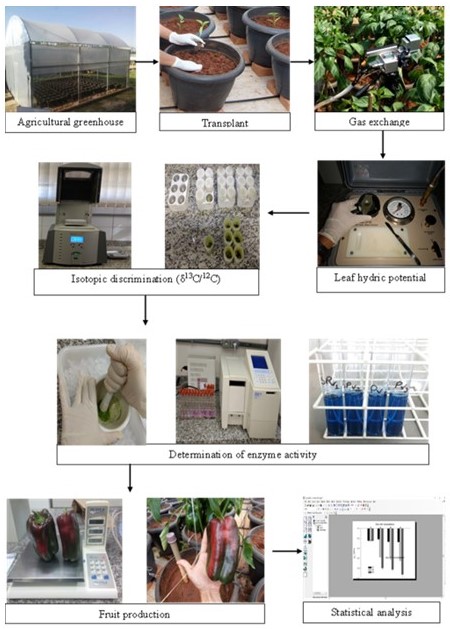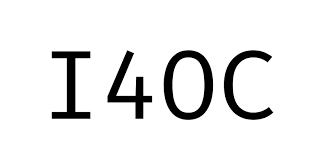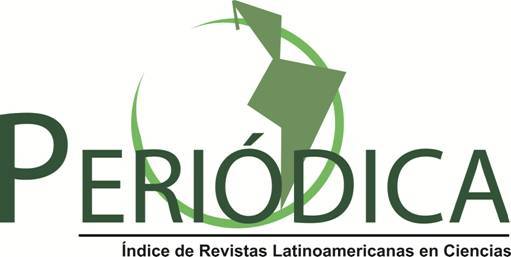Intercambio de gases, relación isotópica de δ13C/12C y actividad enzimática en pimiento morrón bajo diferentes riegos
DOI:
https://doi.org/10.18633/biotecnia.v26.2217Palabras clave:
Capsicum annuum L., asimilación de carbono, estrés hídrico, productividad del metabolismoResumen
El cultivo de pimiento morrón demanda prácticas de riego para garantizar la producción y calidad del fruto. El objetivo de este trabajo fue estudiar los cambios fisiológicos y bioquímicos, así como la variación en la discriminación isotópica de δ13C en plantas de pimiento sometidas a diferentes aspas de riego. El diseño experimental se organizó en un diseño completamente al azar (DCA) con tres tratamientos (aspas de riego) y cinco repeticiones. Aspa 1 (B1): Ψm = 10 a 15 kPa, aspa 2 (B2): Ψm = 34 a 40 kPa y aspa 3 (B3): Ψm = 54 a 60 kPa. Se realizaron cuatro evaluaciones a los 50, 65, 80 y 95 días después del trasplante (DDT), midiendo el potencial hídrico foliar (Ψlw), la asimilación neta de CO2 (A), la conductancia estomática (gs), la transpiración (E), la discriminación isotópica (δ13C/12C), actividad enzimática de nitrato reductasa (NR), superóxido dismutasa (SOD) y catalasa (CAT). Finalmente se recolectaron frutos para determinar la productividad. En plantas de pimiento morrón con menor disponibilidad de agua y, dependiendo de su desarrollo, el potencial hídrico foliar fue más negativo, resultando en un mayor cierre de estomas lo que provocó una disminución considerable en la asimilación neta de CO2, transpiración, actividad de la enzima nitrato reductasa y producción de frutos y mayor actividad de las enzimas antioxidantes. El aumento y la duración de la restricción de agua en las plantas de pimiento morrón indujeron una menor discriminación isotópica de δ13C.
Descargas
Citas
Abid, G., M’hamdi, M., Mingeot, D., Aouida, M., Aroua, I., Muhovski, Y., Sassi, K., Souissi, F., Mannai, K. and Jebara, M. 2017. Effect of drought stress on chlorophyll fluorescence, antioxidant enzyme ac-tivities and gene expression patterns in faba bean (Vicia faba L.). Archives of Agronomy and Soil Science. 63: 536-552. https://doi.org/10.1080/03650340.2016.1224857.
Adiredjo, A.L., Navaud, O., Lamaze, T. and Grieu, P. 2014. Leaf carbon isotope discrimination as an accurate indicator of water-use efficiency in sunflower genotypes subjected to five stable soil water contents. Journal of Agronomy and Crop Science. 200: 416-424. https://doi:10.1111/jac.12079.
Alscher, R.G., Erturk, N. and Heath, L.S. 2002. Role of superoxide dismutases (SODs) in controlling oxidative stress in plants. Journal of Experimental Botany. 53: 1331-1341. https://doi.org/10.1093/jexbot/53.372.1331.
Apel, K. and Hirt, H. 2004. Reactive oxygen species: metabolism, oxidative stress, and signal transduction. Annual Review of Plant Biology. 55: 373–399. https://doi.org/10.1146/annurev.arplant.55.031903.141701.
Araus, J.L., Cabrera-Bosquet, L., Serret, M.D., Bort, J. and Nieto-Taladriz, M.T. 2013. Comparative performance of δ13C, δ 18O and δ 15N for phenotyping durum wheat adaptation to a dryland envi-ronment. Functional Plant Biology. 40: 595–608. http://dx.doi.org/10.1071/FP12254.
Bradford, M.M. 1976. A rapid and sensitive method for the quantitation of microgram quantities of protein utilizing the principle of protein-dye binding. Analytical Biochemistry. 72: 248-254. https://doi.org/10.1016/0003-2697(76)90527-3.
Brito, G.G., Suassuna, N.D., Silva, V.N., Sofiatti, V., Diola, V. and Morello, C.L. 2014. Leaf-level carbon isotope discrimination and its relationship with yield components as a tool for cotton phenotyping in unfavorable conditions. Acta Scientiarum. Agronomy. 36: 335-345. https://doi.org/10.4025/actasciagron.v36i3.17986.
Campbell, W.H. 1988. Nitrate reductase and its role in nitrate assimilation in plants. Physiologia Plantarum. 74(1): 214-219. https://doi.org/10.1111/j.1399-3054.1988.tb04965.x.
Carelli, M.L.C., Ungaro, M.R.G., Fahl, J.I. and Novo, M.C.S.S. 1996. Níveis de nitrogênio, metabolismo, crescimento e produção de girassol. Revista Brasileira de Fisiologia Vegetal. 8: 123-130.
Carvalho, J.deA., Rezende, F.C., Oliveira, E.C. and Aquino, R.F. 2016. Pimentão cultivado em ambiente protegido sob diferentes tensões de água no solo. Engenharia na Agricultura. 23: 236-245. https://doi.org/10.13083/reveng.v24i3.670.
Delfine, S., Loreto, F. and Alvino, A. 2001. Drought-stress effects on physiology, growth and biomass production of rainfed and irrigated bell pepper plants in the Mediterranean region. Journal of the American Society for Horticultural Science, 126(3): 297-304. https://doi.org/10.21273/JASHS.126.3.297.
Dermitas, C. and Ayas, S. 2009. Deficit irrigation effects n pepper (Capsicum annuum L. Demre) yield in unheated greenhouse condition. Journal of Food, Agriculture & Environment. 7: 989-993.
Dietz, K.J., Jacob, S., Oelze, M.L., Laxa, M., Tognetti, V., de Miranda, S.M., Baier, M. and Finkemeier, I. 2006. The function of peroxiredoxins in plant organelle redox metabolism. Journal of Experimental Botany. 57(8): 1697–1709. https://doi.org/10.1093/jxb/erj160.
Dourado-Neto, D., Nielsen, D.R., Hopmans, J.W., Reichardt. K. and Bacchi, O.O.S. 2000. Software to model soil water retention curves (SWRC, version 2.00). Scientia Agricola. 57: 191- 192. http://dx.doi.org/10.1590/S0103-90162000000100031.
Ehlers, W. and Goss, M. 2003. Water Dynamics in Plant Production. CABI Publishing, Oxon/Cambridge.
Farquhar, G.D., O'leary, M.H. and Berry, J.A. 1982. On the relationship between carbon isotope discrimi-nation and the intercellular carbon dioxide concentration in leaves. Australian Journal Plant Physi-ology. 9: 121-137. https://doi.org/10.1071/PP9820121.
Ferrara, A., Lovelli, S., Di Tommaso, T. and Perniola, M. 2011. Flowering, growth and fruit setting in greenhouse bell pepper under water stress. Journal of Agronomy, 10(1): 12–19. https://10.3923/ja.2011.12.19.
Frizzone, J.A., Gonçalves, A.C.A. and Rezende, R. 2001. Produtividade do pimentão amarelo, Capsicum annum L., cultivado em ambiente protegido, em função do potencial mátrico de água no solo. Acta Scientiarum. 23: 1111-1116.
Giannopolitis, C.N. and Ries, S.K. 1977. Superoxide dismutases: I. Occurrence in higher plants. Plant Physiology. 59: 309-314. https://doi.org/10.1104/pp.59.2.309.
González-Dugo, V., Orgaz, F. and Fereres, E. 2007. Responses of pepper to deficit irrigation for paprika a production. Scientia Horticulturae. 114(2): 77-82. https://doi.org/10.1016/j.scienta.2007.05.014.
Jaworski, E.G. 1971. Nitrate reductase assay in intact plant tissues. Biochemical and Biophysical Research Communications. 43(6): 1274–1279. https://doi.org/10.1016/S0006-291X(71)80010-4.
Kramer, P.J. and Boyer, J.S. 1995. Water relations of plants and soils. San Diego, CA: Academic Press.
Kulkarni, M. and Phalke, S. 2009. Evaluating variability of root size system and its constitutive traits in hot pepper (Capsicum annum L.) under water stress. Scientia Horticulturae. 120(2): 159-166. https://doi.org/10.1016/j.scienta.2008.10.007.
Kumar, R., Solankey, S.S. and Singh, M. 2012. Breeding for drought tolerance in vegetables. Vegetable Science. 39(1): 1-15.
Marur, C.J., Mazzafera, P. and Magalhães, A.C. 2000. Atividade da enzima redutase do nitrato em algodoeiro submetido ao déficit hídrico e posterior recuperação da turgescência. Scientia Agricola. 57: 277-281. https://doi.org/10.1590/S0103-90162000000200013.
Miller, G., Suzuki, N., Ciftci‐Yilmaz, S. and Mittler, R. 2010. Reactive oxygen species homeostasis and signalling during drought and salinity stresses. Plant, Cell and Environment. 33: 453–467. https://doi.org/10.1111/j.1365-3040.2009.02041.x.
Nardini, A., Tyree M.T. and Salleo, S. 2001. Xylem cavitation in the leaf of Prunus laurocerasus and its impact on leaf hydraulics. Plant Physiol. 125: 1700–1709. https://doi.org/10.1104/pp.125.4.1700.
Noctor, G. and Foyer, C.H. 1998. Ascorbate and glutathione: keeping active oxygen under control. Annual Review of Plant Physiology and Plant Molecular Biology. 49: 249–279. https://doi.org/10.1146/annurev.arplant.49.1.249.
Paiva, A.S., Fernandes, E.J., Rodrigues, T.J.D. and Turco, J.E.P. 2005. Condutância estomática em folhas de feijoeiro submetido a diferentes regimes de irrigação. Engenharia Agrícola, 25(1): 161-169. https://doi.org/10.1590/S0100-69162005000100018.
Peixoto, P.H.P., Cambraia, J., Sant’Anna, R., Mosquim, P.R. and Moreira, M.A. 1999. Aluminum effects on lipid peroxidation and on the activities of enzymes of oxidative metabolism in sorghum. Revista Brasileira de Fisiologia Vegetal, 11(3): 137–143.
Raij, B.V., Cantarella, H., Quaggio, J.A. and Furlani, A.M.C. 1997. Recomendações de adubação e calagem para o Estado de São Paulo. 2.ed. revisada e atualizada. Campinas, Instituto Agronômico/Fundação IAC, 285 p. (Boletim técnico, 100). Brazil.
Rouphael, Y., Cardarelli, M., Colla, G. and Rea, E. 2008. Yield, mineral composition, water relations, and water use efficiency of grafted mini-watermelon plants under deficit irrigation. HortScience. 43(3): 730–736. https://doi.org/10.21273/HORTSCI.43.3.730.
Scholander, P.F., Bradstreet, E.D., Hemmingsen, E.A. and Hammel, H.T. 1965. Sap pressure in vascular plants: negative hydrostatic pressure can be measured in plants. Science, 148(3368): 339-346. https://doi: 10.1126/science.148.3668.339.
Sezen, S.M., Yazar, A. and Eker, S. 2006. Effect of drip irrigation regimes on yield and quality of field grown bell pepper. Agricultural Water Management, 81(1-2): 115-131. https://doi.org/10.1016/j.agwat.2005.04.002.
Srivastava, H.S. 1980. Regulation of nitrate reductase activity in higher plants. Phytochemistry. 19: 725-733. https://doi.org/10.1016/0031-9422(80)85100-4.
Taiz, L. and Zeiger, E. 2002. Plant Physiology. (3rd ed). Sunderland, Massachusetts: Sinauer Associates, Inc., Publisher.
Trani, P.E., Tivelli, S.W. and Carrijo, O.A. 2011. Fertirrigação em Hortaliças. 2.ª ed. Revisado e atualizado. Campinas: Instituto Agronômico, 51p. (Série Tecnologia APTA. Boletim Técnico IAC, 196). Brazil.
Van Genuchten, M.Th. 1980. A closed-form equation for predicting the hydraulic conductivity of unsatu-rated soils. Soil Science Society of America Journal. 44(5): 892-898. https://doi.org/10.2136/sssaj1980.03615995004400050002x.
Yousfi, S., Serret, M.D., Márquez, A.J., Voltas, J. and Araus, J.L. 2012. Combined use of δ13C, δ18O and δ15N tracks nitrogen metabolism and genotypic adaptation of durum wheat to salinity and water deficit. New Phytologist. 194(1): 230–244. https://doi.org/10.1111/j.1469-8137.2011.04036.x.
Yuan, X.K., Yang, Z.Q., Li, Y.X., Liu, Q. and Han, W. 2016. Effects of different levels of water stress on leaf photosynthetic characteristics and antioxidant enzyme activities of greenhouse tomato. Photo-synthetica. 54: 28–39. https://doi: 10.1007/s11099-015-0122-5.

Descargas
Archivos adicionales
Publicado
Cómo citar
Número
Sección
Licencia
Derechos de autor 2023

Esta obra está bajo una licencia internacional Creative Commons Atribución-NoComercial-CompartirIgual 4.0.
La revista Biotecnia se encuentra bajo la licencia Atribución-NoComercial-CompartirIgual 4.0 Internacional (CC BY-NC-SA 4.0)















_(2).jpg)








